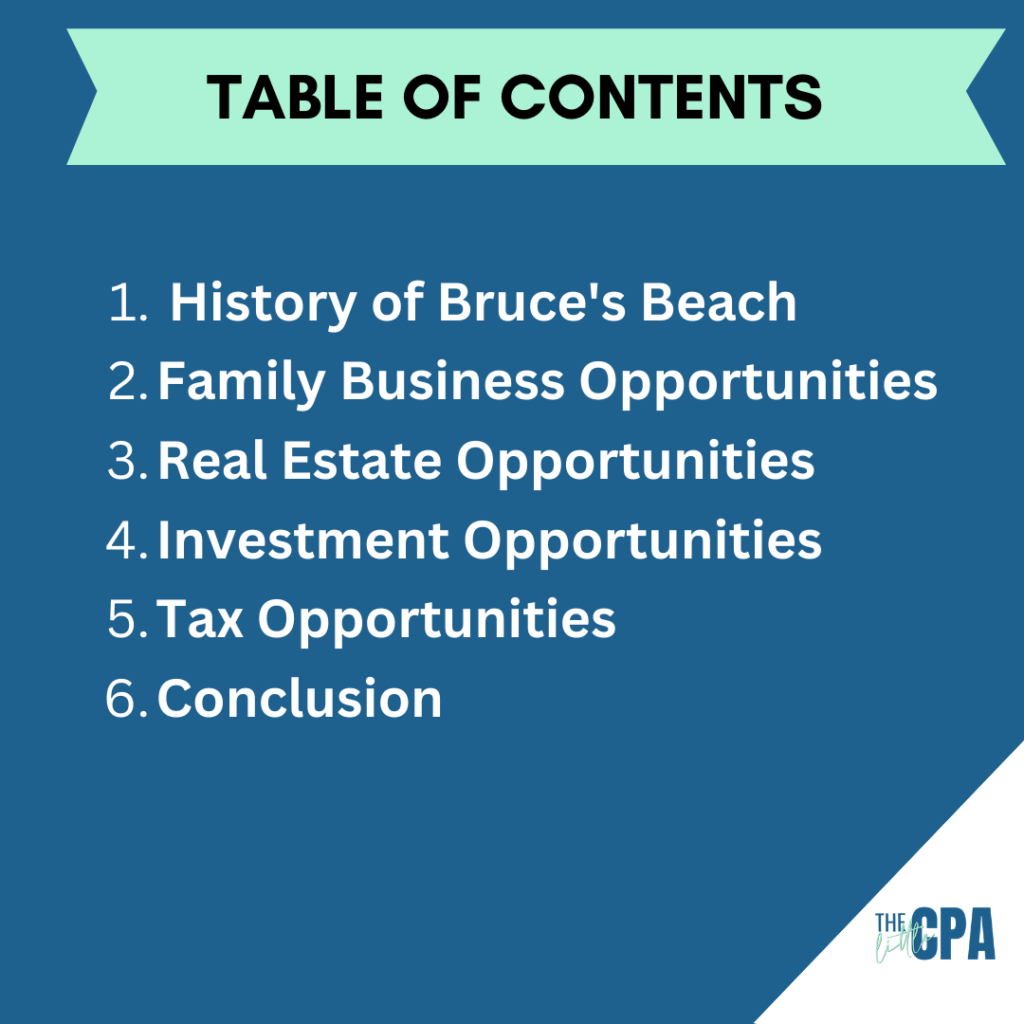After a long, hard-fought, public campaign to return Bruce’s Beach to its rightful owners, many of us were shocked when we learned the owners plan to sell their newly acquired property back to LA County.
It seemed that decades of effort had been in vain.
When it comes to generational wealth, isn’t selling Grandma’s house a no-no?
The heirs of Bruce’s Beach decided it wasn’t.
Why?
Well, that’s their business. We have to trust that they did what was best for their family.
In the meantime, we can learn from the business, real estate, investment and tax opportunities the Bruce family had to consider in their decision to sell their family’s land.

The History of Bruce’s Beach
In 1912, Willa and Charles Bruce bought a beach-front property in Manhattan beach for $1,225. On the property, they established a resort and named it for Mrs. Bruce.
According to the plaque that sits in front of Bruce’s Beach today –
“The popularity of the Bruces’ resort increased, drawing hundreds and at times thousands of Black visitors to the area. By the summer of 1916, the Bruce’s replaced their portable cottage with a two-story structure that included changing rooms, a dance hall, and restaurant.”
This was a significant accomplishment for a black family during the Jim Crow era.
And, consequently, many Manhattan Beach residents took offense to the Bruce family’s success.
 Community members who opposed this black-owned business began to terrorize the Bruce’s and their customers.
Community members who opposed this black-owned business began to terrorize the Bruce’s and their customers.
Opposers would slash the tires of resort visitors, put “No Trespassing” signs nearby to make it difficult for visitors to walk to the water, and even set a mattress on fire on the property.
Finally, in the 1920s, a real estate agent developed a plan that would push the Bruce’s off the property.
The plan was to get the city to take over the property via eminent domain.
As reported in an American College of Trust and Estate Council (ACTEC) Interview with the Bruces’ heirs attorney , “In 1927, eminent domain was used by the city of Manhattan Beach to seize the property with the plan to create a park.”
Once the city council vote was complete, the city paid the Bruce family a small amount and condemned the beachfront property.
Willa and Charles Bruce passed away less than a decade later.
Restoring Justice
After a prolonged period of inactivity, the Manhattan Beach Recreation Commission faced fears that family of the former landowners could potentially reclaim their land.
In response, they constructed Bayview Terrace Park in 1962.
45 years later, under the leadership of Mayor Mitch Ward – Manhattan Beach’s first Black Mayor – the park was renamed “Bruce’s Beach” to honor the family who’s land was wrongfully condemned.
True victory, however, came on September 26, 2021, when Governor Gavin Newsom signed SB 796, a bill that allowed the State to return the Manhattan Beach land to descendants of its original owners.
The land was transferred to descendants of the Bruce family, with an option to sell the land back to the county for its market value.
Less than 2 years later, on January 3, 2023, the chair of the Los Angeles County Board of Supervisors announced the family had opted to sell the property back to Los Angeles County for $20 million.
The family’s decision to sell their beloved property was certainly not taken lightly. While the specifics of why they made this tough choice remain unknown, others who have had to make tough decisions about managing inherited property can sympathize with their struggles and respect their final verdict.
Family Business Opportunities
 When Manhattan Beach condemned Willa and Charles Bruce’s property in 1927 – they took away their American Dream.
When Manhattan Beach condemned Willa and Charles Bruce’s property in 1927 – they took away their American Dream.
They took away almost 100 years of profit.
100 years of employment opportunities.
100 years of tax-saving strategies like selling Qualified Small Business Stock, intra-family loans and other strategies specific to family businesses.
100 years of wealth.
Family businesses significantly contribute to America’s wealth.
According to data from the U.S Census Bureau, the majority (nearly 90%) of American businesses are owned or controlled by families.
George Fatheree III, the real-estate attorney who represented the Bruce’s descendants, said Willa and Charles Bruce’s heirs should have grown up in a “hospitality dynasty.”
Yes, the descendants of the Bruce family could have kept the land to revive the family business and generate new wealth opportunities.
But times are different. More importantly, real estate is different.
Real Estate Opportunities

But, Bruce’s Beach in 2023 is not the same real estate as Bruce’s Beach in 1912.
Today, Bruce’s Beach is zoned for public use only.
According to Fatheree, Bruce’s beach is not zoned for development, and the family members were wary of the years-long permitting fight they would need to wage against Manhattan Beach, environmentalist groups, and others if they wanted to start building on the land.
Currently, the family leases the land to LA County under a 24-month lease in which it receives $413,000 a year for the County to operate a lifeguard station.
What happens if the County doesn’t extend the lease?
What if there aren’t any real estate developers who want to buy land zoned for public use?
When we consider the real estate factors specific to Bruce’s Beach, we can understand the difficult decision to keep or sell the property.
And, these are factors any heir should consider when they inherit “Grandma’s house.”
Yes, normally, holding onto real estate is one of the best opportunities to preserve and build intergenerational wealth. But, not all real estate is equal.
In some cases, better investment opportunities are available.
Investment Opportunities
Hopefully the Bruce family did what any business person should do when pursuing an investment opportunity – they ran the numbers.
To generically consider their investment opportunities, let’s do the same.
- First, let’s say LA County extended their lease indefinitely and continued to pay the Bruce family $413,000 per year. If the Bruce family invested the proceeds every year and factored in inflation and taxes, it would take approximately four decades for that annual investment to grow to $20 million. (Note, this growth does not factor property tax and other costs to own the land.)
- Second, let’s say they sold the land for $20 million and invested the proceeds for four decades. By 2063, that $20 million would grow to almost $100 million considering taxes and inflation.
When you consider these numbers, each family member’s current stage in life, family financial history, financial goals and their historical relationship with the government – which investment opportunity would you choose?
The fact of the matter is, if each family member uses their portion of the money to take advantage of other investment opportunities – buying valuable real estate elsewhere, growing their stock portfolio, investing in profitable business, etc. – then they can continue to carry on the American dream of their ancestors.
Well, they can carry on the dream as long as they factor in everyone’s favorite topic…
Taxes.
Tax Opportunities

When you scroll through social media comments, several posts assume the family sold the land because the property taxes were too high.
Well, that is likely not the case.
SB 796 specifically states that the land would not be assessed for property tax at its current value.
Instead, the land was assessed as if it was continuously owned by the Bruce’s since the 1920s.
So, yes, the family had to pay property tax. But, the property tax was not an insurmountable amount.
Not only did the legislation limit property tax, it also exempted the transfer of property from state income tax (the federal tax implication is unclear at this time).
Sweet deal, right?
Capital Gains on Sale of Bruce’s Beach
Before you get too excited, know that Section 2 (h)(3)(B)(ii) of SB 796 states that the state tax exemption only applies to the initial property transaction.
So, it’s likely that the income from the second transaction (the $20 million of proceeds from the beach property sale) will be subject to both federal and state income tax.
For all of you tax nerds – the sale proceeds will probably be subject to capital gains tax or ordinary income tax (and net investment income tax.) The tax determination will depend on when cost basis was established.
It’s also possible the transaction could be subject to special tax rules that accommodate the uniqueness of returned land.
 To limit their tax liability, the family members can take advantage of certain tax-saving strategies such as:
To limit their tax liability, the family members can take advantage of certain tax-saving strategies such as:
- Like-kind exchanges,
- Opportunity Zones, or
- Estate Planning entities like Charitable Remainder Trusts
Each family will have to make the best tax decision that aligns with their risk tolerance and financial goals.
And, depending on how their proceeds grow over time, they might also have to consider estate tax implications of the sale.
Conclusion: Lessons from Bruce’s Beach
Although the Bruce’s Beach inheritance a first of it’s kind – the wealth considerations and opportunities are quite common among property heirs.
Deciding whether to keep the family business, reassessing the longevity of current real estate, considering other investment opportunities and evaluating the tax implications are all factors heirs have to consider when they receive property from prior generations.
Many black people, however, have not yet had the opportunity to experience these considerations due to our country’s history of systemic injustice and lack of access to resources.
Thankfully, even though the road to financial freedom has been a difficult one for many, the Bruce’s Beach story of perseverance and resilience proves that, under God’s provision, progress is possible.
God not only establishes our steps, he loves justice.
In a public ceremony acknowledging the land deed transfer, the family acknowledged that “without God, we would not be here today.”
Additionally, this powerful narrative reminds us not only of how much we’ve endured as generations in pursuit of wealth, but also about our collective strength when it comes to restoring justice and providing opportunities for others who lack access.
May our collective efforts, God’s guidance and proper estate-planning bring about generations-long success!
This material has been prepared for informational purposes only, and is not intended to provide, and should not be relied on for, tax, legal, investment or accounting advice. You should consult your own tax, legal, investment and accounting advisers before engaging in any transaction.


